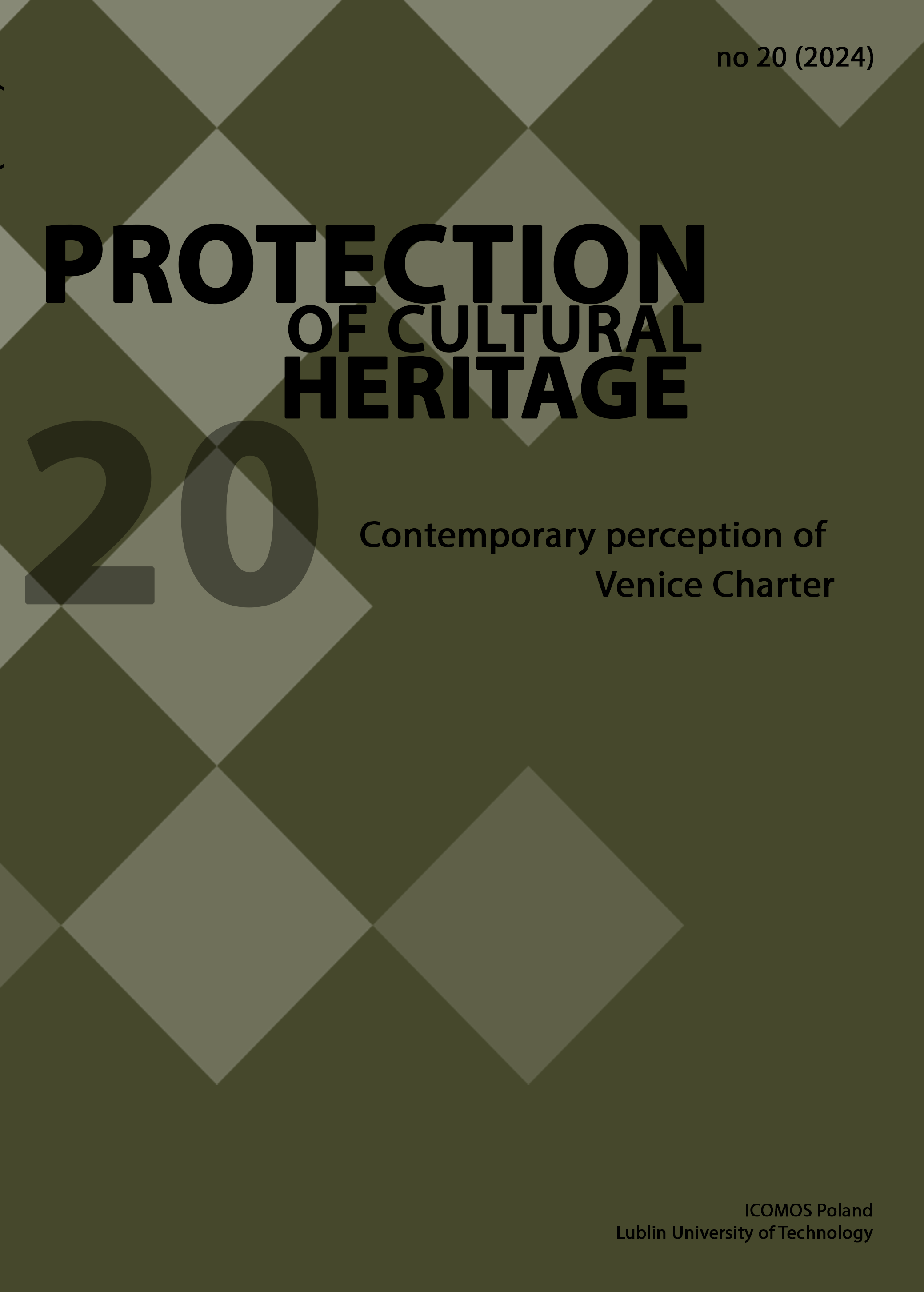The Venice Charter in the age of climate change
Article Sidebar
Issue No. 20 (2024)
-
Venice at 60: Article 5 and the acceptable limits of use
Nigel Walter1-19
-
The Venice Charter – between protection and socially useful purpose.
Examples of World Heritage Cities in Germany and PolandIuliia Eremenko, Tymoteusz Kraski21-31 -
The legacy of Erich Mendelsohn – expression and context in the architecture of Modern Movement.
The way to the UNESCO World Heritage ListMaria Jolanta Sołtysik33-48 -
The Venice Charter – the foundation of heritage protection or the burden of the past? An answer through the Greek experience
Dimitrios Zygomalas49-68
-
New uses of castles owned by municipalities in the province of Alicante (Spain) during the first quarter of the 21st century
Juan Antonio Mira Rico69-91
-
The Venice Charter in the age of climate change
Tino Mager93-102
-
From monuments to living heritage. Revisiting the Venice Charter in the conservation of younger industrial heritage
Alberte Klysner Steffensen103-121
Main Article Content
DOI
Authors
Abstract
This article is a reflection on the Venice Charter as a product of the 1960s and places it in the context of the built heritage and the discourse related to it at that time. It provides reflections on the continued validity of the Charter, and, in particular, on its significance in times of changing climatic conditions. The article aims to re-contextualize the Charter in the 21st century and makes suggestions to ensure its continued relevance. While the Venice Charter defined the main principles of heritage conservation in the second half of the 20th century, it remains unclear whether these principles although recognized and acknowledged can be maintained in a world with very different conditions for built heritage.
Keywords:
References
DeSilvey, C. (2017). Curated Decay: Heritage beyond Saving. University of Minnesota Press.
Direzione generale per le antichità e belle arti. (1964). 2a Mostra internazionale del restauro monumentale, Venezia, Palazzo Grassi, 25 maggio–25 giugno 1964, in occasione del II. Congresso internazionale degli architetti e tecnici dei monumenti. Palazzo Grassi.
ECMWF (European Centre for Medium-Range Weather Forecasts). (2024). Copernicus: 2023 is the hottest year on record, with global temperatures close to the 1.5°C limit. Press Release, 9 January.
European Commission, Directorate-General for Education, Youth, Sport and Culture. (2022). Strengthening cultural heritage resilience for climate change – Where the European Green Deal meets cultural heritage. Publications Office of the European Union.
Gazzola, P., & Roberto P. (1971). Proposte per una Carta internazionale del Restauro. In ICOMOS. Il monumento per l’uomo: atti del II Congresso Internazionale del Restauro Venezia, 25–31 maggio 1964 = Le monument pour l’homme: actes du II Congrès International de la Restauration = The monument for the man: records of the II International Congress of Restoration (pp. 14–19). Marsilio.
Holtorf, C. (2015). Averting loss aversion in cultural heritage. International Journal of Heritage Studies, 21(4), 405–421. https://doi.org/10.1080/13527258.2014.938766 DOI: https://doi.org/10.1080/13527258.2014.938766
ICOMOS. (1971). Il monumento per l’uomo: atti del II Congresso Internazionale del Restauro Venezia, 25–31 maggio 1964 = Le monument pour l’homme: actes du II Congrès International de la Restauration = The monument for the man: records of the II International Congress of Restoration. Marsilio.
ICOMOS. (2014). ICOMOS debate on permissibility and standards for reconstructions of monuments and sites. http://www.icomos.org/en/what-we-do/disseminating-knowledge/ newsletters/704-icomos-debate-on-permissibility-and-standards-for-reconstructions-of- monuments-and-sites-online-survey.
ICOMOS. (2024). Anpassungsstrategien für Baudenkmale im Klimawandel. ICOMOS.
International Committee of the Red Cross (2021). The Climate and Environment Charter for Humanitarian Organizations. URL: https://www.icrc.org/en/document/red-cross-red-crescent-humanitarian-sector-joins-forces-tackle-existential-threat-climate
Langenberg, S. (Ed.) (2018). Reparatur. Anstiftung zum Denken und Machen. Hatje Cantz.
Lipp, W. (1994). Vom modernen zum postmodernen Denkmalkultus? Aspekte zur Reparaturgesellschaft. In: Lipp, W., Petzet, M. (Eds.) Vom modernen zum postmodernen Denkmalkultus? Denkmalpflege am Ende des 20. Jahrhunderts. Bayerisches Landesamt für Denkmalpflege.
Mach, K.J. & Siders, A.R. (2021). Reframing strategic, managed retreat for transformative climate adaptation. Science, 372,1294–1299. DOI:10.1126/science.abh1894 DOI: https://doi.org/10.1126/science.abh1894
Mager, T. (2016). Schillernde Unschärfe. Der Begriff der Authentizität im architektonischen Erbe. DeGruyter. DOI: https://doi.org/10.1515/9783110458343
Meurs, P. (2007). A charter for each intervention: from generic to specific guidelines. City & Time, 3(3), 53–60.
Molajoli, B. (1964). In: Direzione generale per le antichità e belle arti. (1964). 2a Mostra internazionale del restauro monumentale, Venezia, Palazzo Grassi, 25 maggio–25 giugno 1964, in occasione del II. Congresso internazionale degli architetti e tecnici dei monumenti. (p. VI) Palazzo Grassi.
Normand, C. (Ed.). (1889). Congrès international pour la protection des œuvres d’art et des monuments, tenu à Paris du 24 au 29 juin 1889. Imprimerie Nationale.
Normand, C. (1889b). Premières idées sur l’organiation de la Croix Rouge pour la protection des monuments en temps de guerre. L’Ami des monuments, 3, 272–277.
Priebe, J., Reimerson, E., Hallberg-Sramek, I. et al. (2022). Transformative change in context—stakeholders’ understandings of leverage at the forest–climate nexus. Sustain Sci, 17, 1921–1938. https://doi.org/10.1007/s11625-022-01090-6 DOI: https://doi.org/10.1007/s11625-022-01090-6
Seck, A. (2021). Klimaopfer Denkmal. monumente online. 6, 2021, https://www.monumente-online.de/de/ausgaben/2021/3/Klimaopfer-Denkmal.php (access: 18 March 2024).
Weststeijn, T. (2023). De Toekomst van het verleden. Erfgoed en Klimaat. Prometheus.
Zachwatowicz, Jan. (1971). Nouveaux Aspects de la Théorie de Conservation des Monuments historiques. In ICOMOS. Il monumento per l’uomo: atti del II Congresso Internazionale del Restauro Venezia, 25–31 maggio 1964 = Le monument pour l’homme: actes du II Congrès International de la Restauration = The monument for the man: records of the II International Congress of Restoration (pp. 47–53). Marsilio.
Article Details
Abstract views: 350







